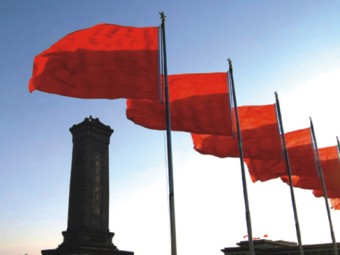Neighbours
Sixty Years in Review'
China threw a lavish party October 1 to mark its 60th birthday, with awe-inspiring and jaw-dropping pageantry that could only be compared in scale and glitz with the Beijing Olympics last year. The military parade that showcased the country's latest military hardware, with thousands of goose-stepping troops marching past the reviewing stand in formation to salute their commander-in-chief was nothing short of extraordinary. The show of strength carried one unmistakable message: China's rise is real.
If last year's Olympics was China's “international coming-out party,” then this year's grand birthday bash was an occasion for the debutant to show how confident and assertive it can move to the centre stage of the world arena.
The event took place right after Hu Jintao, who wears three hats as state president, Chinese Communist Party general secretary, and chairman of the all-powerful Central Military Commission, returned from a “summit journey” to America where he attended the United Nations summit on climate change in New York and the Group of 20 Summit in Pittsburgh. The Chinese leader played a pivotal role in both meetings as China is wielding ever-increasing clout on world issues, economic as well as political.
While China's ostentatious show of force last Thursday in Tiananmen Square was criticised by many in the world, including Taiwan's Democratic Progressive Party, as sable rattling and menacing, there were also others who did not see eye to eye, arguing that the country should not be faulted for letting the world know that “China has stood up” and deserves to take it's rightful place in the community of nations.
China's influence over world affairs has been rapidly growing and keenly felt since it hosted the 2008 Summer Olympics, widely hailed as the most spectacular and impressive ever. China topped the gold medal list with 52, dethroning the United States.
Right after the closing of the Olympics in August, the world was hit by a once-in-a-century financial storm. Wall Street melted down in mid-September and the world was suddenly thrown into deep economic recession. China was among the first in the world to respond to the crisis with a US$590 billion economic stimulus package to create jobs and increase spending. Beijing also invested billions of its foreign exchange reserves to buy U.S. debt and International Monetary Fund bonds to help prop up the world economy.
What China is doing today on the world stage would have been unimaginable 60 years ago, when Mao Zedong proclaimed on Oct 1, 1949 that “the Chinese people have stood up.” In fact, however, Mao set back China's development and brought the country to the brink of destruction before his death in 1976. His Great Leap Forward and Great Cultural Revolution all ended in disaster. Mao succeeded only in doing one thing: he made his people “equally poor”.
It was Deng Xiaoping who made China “unequally rich”. Purged three times by Mao as a “revisionist”, Deng launched his overarching reform and opening in 1978. He ditched Maoism in favour of the now-proverbial “catism” that it does not matter whether a cat is black or white as long as it catches mice. Deng allowed “some people to get rich first” and set up “special economic zones” in coastal provinces modelled after Taiwan's “economic processing zones” in the '50s. Three decades later, people in coastal provinces who “got rich first” now enjoyed a living standard comparable to people in Taiwan.
It was Deng, the architect of China's reform and opening experiments, who led China from rags to riches. In 1978, two years after Mao's death and the end of his destructive Cultural Revolution, China was teetering on the verge of economic collapse, with the majority of people living near or below poverty line. Now, 300 million people have been dragged out of poverty. In 2008, China's per capita GDP reached US$2,800, a tenfold increase over that three decades ago.
Looking back, the strides China has made in the past 30 years was a miracle. China is no longer an economic backwater, but a first-world industrial and business powerhouse in booming regions and cities. But changes in politics are much less impressive. Free expression is still restricted and the press is still controlled by the state. Censorship is widespread. Direct elections are unheard of except in rural areas. In this respect, China has a lot to learn from Taiwan.
What will be in store for China in the next 60 years? While it makes little sense to predict a future which depends on many variables, it is likely that China would move further to the centre of the world stage in the next decade when its economy surpasses not only Japan, but also the United States.
--Editorial Desk
The China Post. |
